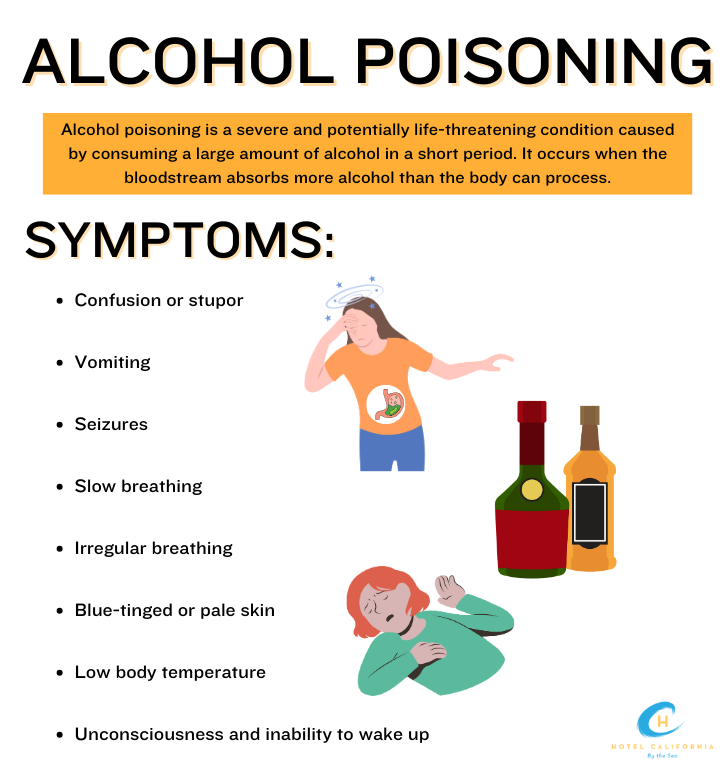How long does Alcohol Poisoning last?
Alcohol poisoning is a condition in which a person consumes excessive amounts of alcohol to the point where the body is unable to efficiently process it causing a toxic build-up of the substance. The body is able to quickly absorb alcohol. However, it can take some time for it to metabolize and expel the substance because it is processed in the liver. Alcohol poisoning can become life-threatening if too much alcohol is consumed too quickly. When this occurs, the liver is unable to work as quickly or efficiently to remove the alcohol. In fact, a person can consume a fatal dose of alcohol even before passing out and even when they are unconscious or they stop drinking. In this case, the stomach can continue to release alcohol into the bloodstream and continually increase the level of alcohol in the body.

Other forms of alcohol poisoning can include poisoning from isopropyl alcohol, which is found in rubbing alcohol and cleaning products. Alcohol poisoning can also include poisoning from methanol or ethylene glycol, which is a common ingredient found in products such as antifreeze, paint or other solvents.
Alcohol is a central nervous system depressant. When it enters into your body it can slow down normal bodily functions such as breathing and cognitive thinking. Alcohol poisoning is the same as alcohol overdose and they are often used interchangeably. Alcohol poisoning occurs when there is too much alcohol in the bloodstream affecting areas of the brain that control basic support functions. Breathing, heart rate regulation, temperature control and other functions become compromised and begin to shut down due to the suppressive nature of the drug. Ultimately, alcohol poisoning can lead to permanent organ and brain damage.
Symptoms of Alcohol Poisoning
- Feeling confused or disoriented
- Lack of coordination
- Vomiting
- Irregular, shallow or slowed breathing
- Slowed heart rate
- Cold and clammy skin
- Low body temperature
- Seizures
- Conscious but unresponsive
- Difficulty staying awake
- Passing out or blacking out

How long does Alcohol Poisoning last?
The duration in which alcohol poisoning lasts is dependent on many variables. It can typically last anywhere from a few hours up to a day. In more severe cases, the effects of alcohol poisoning can last for several days after the last intake. These cases may require hospitalization and medical treatment.
The more alcohol you consume, the longer the poisoning will likely last. This is because your body is constantly taking more and more alcohol without sufficient time for the body to process and eliminate the substance before more is consumed. The type of alcohol consumed and how many drinks you have consumed in a given time impacts how long it stays in your system. Beer, wine, seltzers and hard liquors are all processed at different rates because they all contain different percentages of alcohol concentration.
- 1 beer – 12 oz of alcohol
- 1 glass of wine – 5 oz of alcohol
- 1 shot of liquor – 1.5 oz of alcohol
Each user has a different level of alcohol tolerance. Some people may have a higher tolerance while others have a lower tolerance. This can impact how quickly or slowly alcohol passes through the body.
Medical intervention and supportive care can impact how long alcohol poisoning lasts. The quicker someone receives medical attention, the quicker the symptoms and side effects of alcohol poisoning will be reduced. Staying adequately hydrated can also help the body to more effectively process the alcohol and help the user recover more quickly.
Risk Factors for Alcohol Poisoning
- Binge drinking. Binge drinking involves drinking large volumes of alcohol within a short period of time. The faster you drink alcohol in a short amount of time, the more likely you are to experience alcohol poisoning. In fact binge drinking is a common cause of alcohol poisoning. Binge drinking is considered as 5 or more drinks in the span of 2 hours for men and 4 or more drinks for women. Alcoholic binge drinking can occur over several hours and last up to several days.
- Combining medications with alcohol. When you drink alcohol while also taking other sedative medications, you can increase the risk of alcohol poisoning. This is because the combination will intensely slow down your nervous system and essential body functions due to the depressant nature of both substances.
- Drinking on an empty stomach. The small intestine absorbs alcohol quickly. This creates an abundance of alcohol within the stomach. In turn, it can slowly be released into the bloodstream because the alcohol has been sitting in the stomach for a while.
- Age. Teens and young adults are more likely to engage in binge drinking and experience alcohol poisoning.
- If you have a history of alcohol abuse or alcohol use disorder
Check Your Insurance Coverage for FREE
Find out if your insurance covers addiction treatment in minutes. We accept most insurance!
Dangers of Alcohol Poisoning
If you suspect someone of experiencing alcohol poisoning, call emergency services immediately. Or seek out professional medical attention. Be prepared to give information, do not leave an unconscious person alone and if the person is vomiting, make sure they are sitting up so they do not choke.
- Choking. Alcohol poisoning depresses the gag reflexes and can increase the risk of a person choking on their vomit.
- Respiratory depression. Alcohol poisoning slows down breathing and if a person accidentally inhales their own vomit, it can go into the lungs and lead to other dangerous breathing issues and asphyxiation.
- Severe loss of fluids. Vomiting causes dehydration which occurs due to water and fluid loss in the body.
- Seizures. When experiencing alcohol poisoning, a person’s blood sugar levels can drop so low to the point of inducing seizures.
- Hypothermia. The body temperature can drop to the point at which it can lead to cardiac arrest.
- Blackouts. Alcohol poisoning can lead to blacking out, memory loss and amnesia.
- Liver damage. Alcohol is processed in the liver. When there is an excess amount in the body, the liver is unable to efficiently process the substance and can lead to toxic build-up, making the liver work harder and causing liver disease.
- Loss of consciousness
- Alcohol-induced hepatitis
- Irregular heart beat
- Brain damage
How is Alcohol Poisoning usually treated?
- IV fluids are used to treat dehydration and severe water loss as well as replenish vitamins and minerals
- Oxygen therapy or intubation to treat difficulty with breathing
- Stomach pumping uses a tube to vacuum out your stomach of toxins
- Blood filtration or hemodialysis is used to treat your kidneys if they are unable to do their job. Some medical providers can start you on dialysis to filter alcohol from your blood.
Reach out to Hotel California by the Sea
We specialize in treating addiction and other co-occurring disorders, such as PTSD. Our Admissions specialists are available to walk you through the best options for treating your addiction.
Treatment for Alcohol Use Disorder
Alcohol poisoning is a dangerous and life-threatening condition. The best way to avoid alcohol poisoning is to consume alcohol in moderation, avoid drinking on an empty stomach, drink water, avoid binge drinking and be aware of your medications if you drink. However, for some, this is not an option and they have developed a tolerance, dependence and addiction to the central nervous system depressant drug. Professional treatment centers such as Hotel California by the Sea provide alcohol use disorder treatment for those struggling with alcoholism.
We offer treatment at all levels of care including detox, residential, PHP and IOP. We utilize evidence-based treatments including CBT, DBT, and family therapy. Hotel California by the Sea is dedicated to helping our clients achieve their goals of sobriety and overcoming their addiction.
References:
https://www.healthline.com/health/alcoholism/how-long-does-alcohol-poisoning-last
https://www.mayoclinic.org/diseases-conditions/alcohol-poisoning/symptoms-causes/syc-20354386
https://my.clevelandclinic.org/health/diseases/16640-alcohol-poisoning
https://rehabclinicsgroup.com/how-long-does-alcohol-poisoning-last
https://www.niaaa.nih.gov/publications/brochures-and-fact-sheets/understanding-dangers-of-alcohol-overdosehttps://action-rehab.com/how-long-do-alcohol-poisoning-effects-last/
